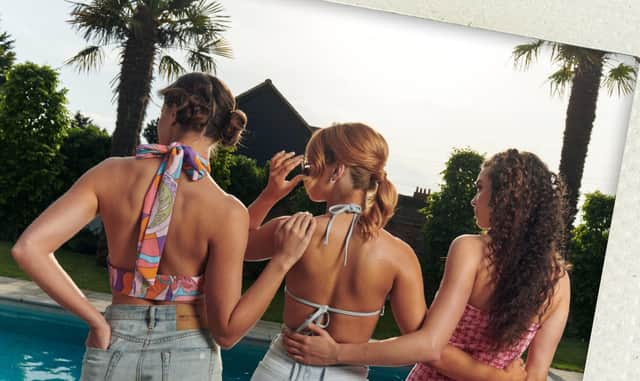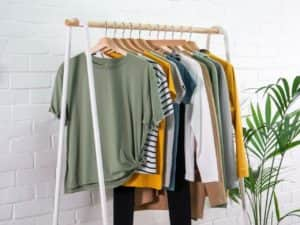Love Island embraces pre-loved fashion - how to help the planet and save cash


Love Island is dressing contestants in second-hand clothes; here's how switching to an eco-friendly capsule wardrobe could save you thousands
The move by Love Island to dress islanders in pre-loved items this season has thrown the spotlight on how we shop for clothes.
Announcing a new partnership earlier this year with the online marketplace, eBay UK, the reality TV show also revealed that for the first time ever, the new villa would feature a shared wardrobe.
Advertisement
Hide AdAdvertisement
Hide AdThe collaboration comes after new research from eBay found that UK shoppers are becoming increasingly conscious of fast fashion.
A fifth of Brits admit that they buy more second-hand fashion compared to two years ago and reveal on average, that 16 percent of their wardrobes are made up of pre-loved clothes.
Many of us are guilty of allowing unworn clothes to go to waste - stuffed under the bed or at the back of a wardrobe.
Those discarded togs that seemed like such a great bargain at the time, now languishing in the space where garments go to die.
Advertisement
Hide AdAdvertisement
Hide AdIn the UK, more than 60 percent of householders have reported that they have unwanted clothes stored in their homes.
According to Office for National Statistics (ONS) data, the average person spends an average of £43.88 on clothes every month - that’s £526.50 per year.
The advent of fast fashion has brought its own collection of environmental woes, from the production process through to disposal.
According to Oxfam, 13 million items of clothing go to UK landfill every week.
Wave goodbye to fast fashion: the wardrobe that could save you thousands of pounds


Advertisement
Hide AdAdvertisement
Hide AdWith one eye on what fast fashion is costing you and the planet, sustainable circular fashion brand, Rapanui, has revealed how many fashion items you need during your adult life and how much money you could save if you used your clothes for their total lifespan.
And with the final figure coming in at almost £27,000, (not taking into account personal lifestyle impacts such as weight change, fluctuations in the cost of clothing over time and washing and care of clothing) that's no small change.
A capsule wardrobe is a minimalist approach to building a small collection of fashion items that can be used to create several different outfits with carefully selected pieces that will forever stay in style.
Here's how to build your capsule wardrobe and how much you could save
Clothes | Average lifespan per item (years) | How many clothing items are needed during lifetime | Amount spent on clothing item over lifetime |
T-shirts and tops | 2.74 | 23 | £336.95 |
Pants | 2.81 | 22 | £547.36 |
Dresses | 3.62 | 17 | £820.25 |
Skirts | 5.62 | 11 | £530.75 |
Outerwear (jackets/coats) | 4.58 | 13 | £685.75 |
Shoes | 1 | 63 | £3,388.14 |
Total: | 149 | £6,309.20 |
Advertisement
Hide AdAdvertisement
Hide AdWith an average of £526.50 spent per year on clothes, this multiplied by the current average length of adult life (63.2 years) is a whopping £33,274.80 spent on clothes during our lifetime, when according to Rapanui's maths, we only need £6,309.20 worth of clothes if we used them for their lifespan.
If we kept to this sustainable capsule wardrobe of 149 items, we could save a staggering £26,965.60.
The £33,274.80 spent on clothes during our lifetime equates to a total of 786 pieces of clothing, of which 637 aren’t needed.
How can your clothes live out their lifespan?
To make sure that your clothes can live out their lifespan, Rheanna Coleman, supply chain lead at Rapanui, advises: “Always follow the wash care label on the individual pieces of clothing to make sure that you’re not causing any damage or shrinking items, making them unwearable.
Advertisement
Hide AdAdvertisement
Hide Ad“Aside from specific steps we’d recommend a cool wash at 30 and hang drying products to ensure longevity and reduce the environmental impact of the washing process.”
Wearing the clothes you already have is the ideal but if you do need to replace worn-out items, look out for brands that operate with a circular production process.
“In a circular process products are designed from the start to be remade," said Mart Drake-Knight, co-founder of sustainable merch platform Teemill.
"That means materials flow back to the maker and the new product is made from the old product.
Advertisement
Hide AdAdvertisement
Hide Ad"It is different from recycling, or upcycling, where the material is turned into something different before it is then thrown away. Circular fashion is infinite because by design the material flows in a loop.
“Circularity means designing products that are made to be remade, creating an option for fashion to be more sustainable for the planet than ever before.”
To find out more about the importance of circular fashion, visit https://rapanuiclothing.com/
Read more: popularity and potential earnings of Love Island contestants revealed at: